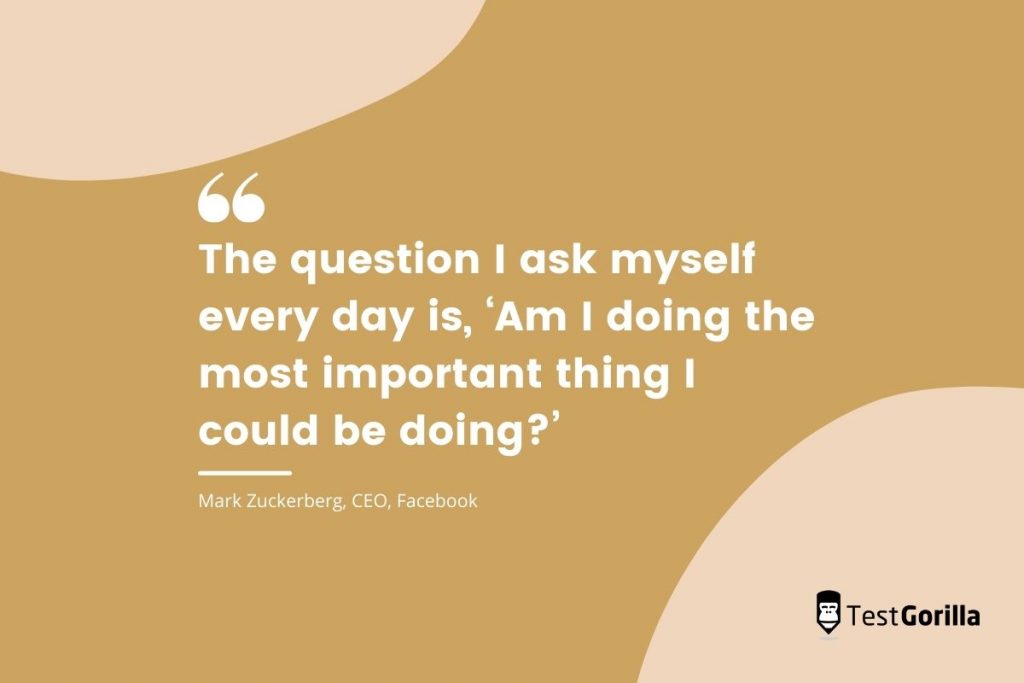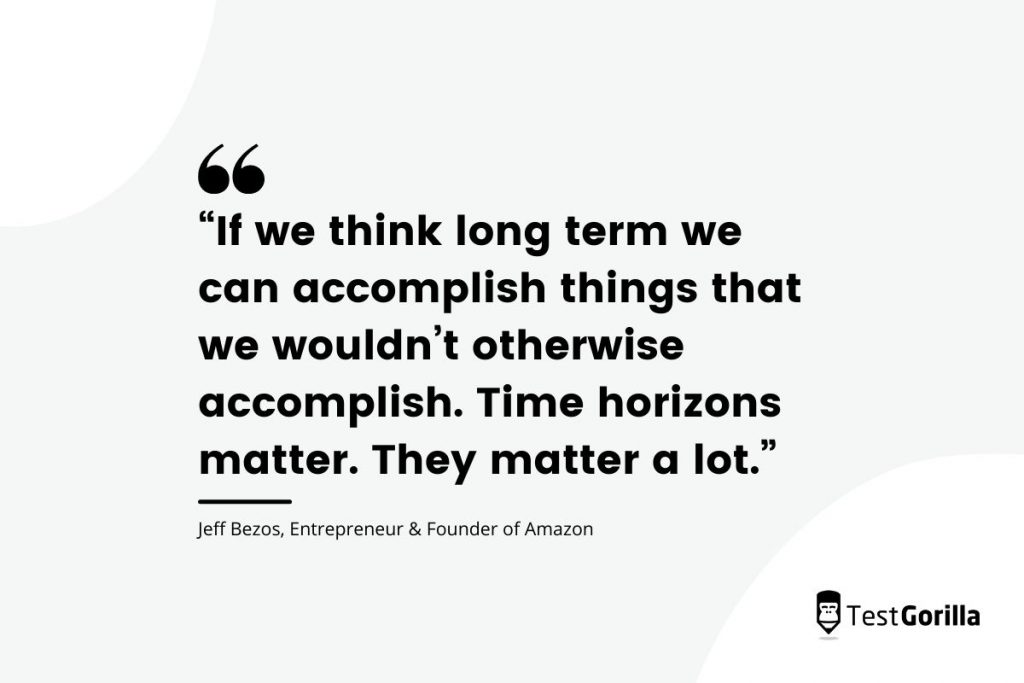In an age where businesses are hyper-focused on creating, maintaining, or rebuilding their companies in the aftermath of the pandemic, hiring underperforming employees is not an option. One of the best ways to ensure that your new hires will be able to work efficiently and complete necessary tasks is to administer a time management assessment.
Effective time management will lead to satisfied clients, deadlines being met, and money being saved. On the other side of the coin, employees that demonstrate poor time management skills will cost your business money and waste company time.
Luckily, time management skills are a strength that you can evaluate early on. In fact, if time management skills are important for the role, we recommend using skills tests at the top of the hiring funnel so that you know each candidate you consider will be able to complete tasks in a timely manner.
Table of contents
What are time management skills?
We have all heard the phrase “work smarter, not harder.” Effective time management does not mean that you are able to get everything done in one day.
Employees who are highly skilled in time management are those that are able to balance multiple projects at once and easily determine the most time-sensitive task of the day and tackle that first. They are able to look at their to-do list and quickly determine the most important tasks first, while also carving out time for projects that may pop up throughout the day that require immediate attention.
There’s always one person that you can think of off of the top of your head that always seems to be incredibly busy. They are always stressed out, with a plate full of projects on their hands, and often turn to muli-tasking in order to get everything done. These are the people that probably don’t possess the best time management skills.
When you have more on your plate, you tend to be more stressed. When you’re more stressed, you tend to produce lower quality work. So it makes sense that people who manage their time well tend to be happier. And we all want happy employees, don’t we?
What roles require time management skills?
In short, every single employee can benefit from strong time management skills. It helps employees at all levels and in all departments to stay on track and be less stressed. It also keeps the company’s wheels turning.
There are three specific reasons why time management is important for every employee:
Time is limited. Each employee has a set number of hours each day. Even if they didn’t, they would still be limited to 24 hours a day. Usually, a workday consists of 8-10 hours each day, so when important tasks need to be accomplished time is of the essence. Further, for hourly employees, a lack of time management skills can lead to overtime hours which will cost you money.
It helps employees stay focused. Even if an employee has a long list of tasks to complete and each one is time-sensitive, by prioritizing their time your employee will be able to think more clearly. That way they will be able to complete tasks more efficiently.
Your employees will have more time for other things. When an employee completes all the immediate tasks that their job requires, they’ll have more time to branch out and learn new skills on the job or to get ahead so that they have more time in the future.
The best insights on HR and recruitment, delivered to your inbox.
Biweekly updates. No spam. Unsubscribe any time.
How to test time management skills with a time management assessment
Since effective time management is so crucial to the overall productivity of your company, hiring employees with a strong ability to manage their time is imperative. There are several ways to evaluate this skillset as you interview and vet your candidates.
The first way is to use online skills assessments. With TestGorilla’s time management test you can determine a candidate’s ability to manage their time before you even read their resume. This time management assessment evaluates a candidate’s ability to manage their time well in a professional environment by asking questions based on typical workplace scenarios.
Based on the candidate’s answers, the test assesses how well they can prioritize, plan, execute, and reflect on tasks and projects. Then, when you’re shortlisting candidates for an interview, you’ll know that you’re only choosing from qualified candidates.
The entire test only takes about ten minutes for the candidate and it can save you time during the candidate selection process and help you avoid wasting time and money on mishires.
Another great way to test for effective time management skills is to ask critical interview questions. Start off with questions like:
“How do you prioritize your tasks?”
“How do you limit distractions?”
“How do you balance your work and your personal life?”
These are all great ways to get the ball rolling on the topic of time management. Encourage each candidate to be as specific as possible, providing concrete examples of times they demonstrated time management.
If you are looking for a hardball question, consider asking something like, “If you had a list of ten things to get done today, but you only got 80% of them done, what would your next steps be?” This is a great way to examine a candidate’s thought process when they find themselves behind the eight ball.
How to help employees improve their time management skills
If you have employees who perform well but seem to struggle to manage their time, there are ways that you can help them improve. Get together with these employees and work with them to develop a professional development plan that charts a path to better time management.
How to create a professional development plan
Duke University’s Human Resources Department recommends taking the following steps in order to put together an effective professional development plan.
Employee self-assessment
The first step is to discover what interests the employee. What are their short- and long-term career goals? Do those goals align with your organizational goals? If so, what are the short- and long-term actions the employee can take to progress towards those goals?
HR assessment
After reviewing the employee’s self-assessment and any information you have from their work record, determine their skill level across the board. Consider their technical skills, social skills, aptitudes, and attitude.
Needs assessment
Based on the employee’s self-assessment and your own assessment, what company objectives could be served by the employee as they progress on their career path.
Consider available development opportunities
Now, look at the opportunities available within your company. For example:
Do you have training programs or educational resources that could help the employee improve?Are there projects the employee can undertake to further their career while also improving their ability to achieve company goals?Is there someone in the company who could serve as a mentor to guide the employee’s progress?
Track employee progress
Finally, you’ll want to measure and track the employee’s progress so that they can see where they’re doing well and where they need further improvement. This way, you can help them to continue building on their skills and address problems that may arise.
Some ways to help an employee improve their time management skills including:
setting personal goals each day,
working to highly organized, and
learning to delegate certain tasks to others or get help when they simply don’t have the time to do it themself.
If you run a business and you’ve noticed that time management is a problem across departments, consider organizing a time management seminar to improve this skill across the board.
You’re only as strong as your weakest link
Every department needs strong, hard-working employees that know how to manage their time. It is one of the key factors that separates successful businesses from unsuccessful ones.
Since your company is only as strong as its weakest employee, if there is even one employee that is dragging their feet, falling behind, and not prioritizing the important tasks at hand, it brings the whole company down and wastes precious time.
Employees with strong time management skills are the ones who will sit down, get their work done, and create value for your company. In order to ensure that you are hiring the best, vet candidates with time management in mind right from the start. Utilizing tools like TestGorilla’s time management assessment is a great way to quickly identify the best talent.
Frequently asked questions about time management
How do you measure time management skills?
The easiest way to measure time management skills is through an online skills assessment. There are many platforms out there that help you assess the time management skills of job candidates and current employees. These tests evaluate a person’s ability to prioritize, plan, execute, and reflect on tasks and projects in a professional environment.
What are the signs of poor time management?
Some of the easiest to observe signs are procrastination, poor work product, missed deadlines, and increased overtime hours. If a candidate is working on less important tasks instead of time-sensitive ones, you’ll usually be able to see it in the work they submit. It may contain errors, be submitted after a deadline, or require a lot of overtime hours to complete.
What are examples of time management skills?
There are four primary time management skills: prioritization, planning, execution, and reflection & communication. Prioritization refers to a person’s ability to prioritize tasks according to deadlines, importance, and impact on company initiatives. Planning skills are a person’s ability to plan their work in the most efficient way, Execution skills are, of course, a person’s ability to execute tasks effectively. Reflection & communication skills are a person’s ability to reflect on their work, monitor its outcomes, and communicate important information with others.
You've scrolled this far
Why not try TestGorilla for free, and see what happens when you put skills first.

























